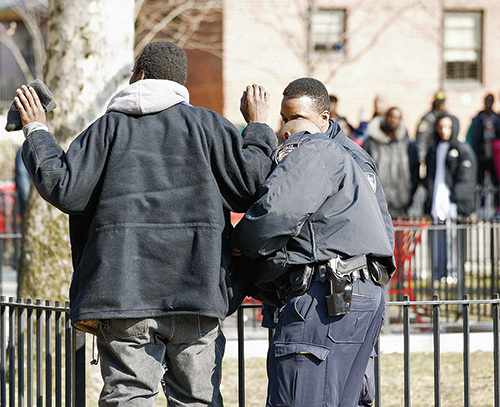The New York City Police Department has carried out 5 million stop-and-frisks in the last
10 years, according to the Associated Press. The practice allows police to detain, question and pat down anyone who they “reasonably suspect” has committed or is about to commit a crime. New York City Mayor Michael Bloomberg and NYPD Commissioner Raymond Kelly, both major proponents of the practice, claim it’s the reason the city’s crime rates are decreasing, according to an NBC News report.
Stop-and-frisk reaches a milestone

The New York City Police Department has carried out 5 million stop-and-frisks in the last
10 years, according to the Associated Press. The practice allows police to detain, question and pat down anyone who they “reasonably suspect” has committed or is about to commit a crime. New York City Mayor Michael Bloomberg and NYPD Commissioner Raymond Kelly, both major proponents of the practice, claim it’s the reason the city’s crime rates are decreasing, according to an NBC News report.
Well, something is definitely decreasing: reasons for people of color to trust the NYPD. Blacks and Latinos account for 86 percent of people stopped, according to a New York Civil Liberties Union report.
For years there’s been major controversy around how police have conducted the stops, but the practice has remained legal since the 1960s. There are signs, however, that this may soon change. A federal civil rights case is currently being heard in New York that asserts the practice is unconstitutional. According to the Associated Press, the Center for Constitutional Rights filed suit on behalf of four black plaintiffs who claim the only reason they were stopped was because of their race—they and millions more.
It sounds great in theory. Nip crime in the bud, right? Stop people who look like they may be up to no good. Seems logical. Until you remember we live in the real world. Recent history should tell us there’s a big problem with this idea. Trayvon Martin, anyone? Hoodies have never been more guilty.
If every single person was being stopped and frisked, maybe there’d be some merit to Bloomberg’s stubborn support of the measure, but they’re not. In a city whose inhabitants are 45 percent white, 27 percent black and 27 percent Latino, according to the 2000 U.S. Census, it’s awfully hard to understand how those numbers add up in “random” stops. What’s even more mind-boggling is that over the last 10 years, almost 90 percent of those stopped weren’t guilty of any crime.
Yet Bloomberg continues to insist that it works: In a press conference last year, he said, “Nobody should ask Ray Kelly to apologize—he’s not going to and neither am I—for saving 5,600 lives. I think it’s fair to say that stop-question-and-frisk has been an essential part of the NYPD’s work.”
Essential for whom? The white majority who rarely gets stopped? Who have little to no interaction with police on a daily basis?
Bloomberg might want to ask Tyquan Brehon how essential it is—Brehon is a black man who says he was stopped more than 60 times before the age of 18. Or Alvin, a local biracial teen, who secretly recorded his interaction with police after constantly being stopped. Once again, it was an offensive hoodie that caused all the problems. When Alvin asked why he would be arrested, an officer responded, “For being a f—ing mutt.”
These aren’t isolated incidences. Though documentaries have been made about both these men, they represent millions of people of color who, day after day, more so than anyone else, miraculously fit the profile of “criminal.”
To criticize the police force would only scratch the surface. In the documentary about Alvin, two officers are interviewed anonymously, and both explain that their jobs depend on how many stop-and-frisks they make. They admit they joined the force to make a difference but soon realized they’d have to do things they didn’t believe in.
It’s so much bigger than the police. The fact that in our country the color of your skin still determines how you are treated on an institutional level is the overarching problem. The darker your skin, the guiltier you are assumed to be.
So, no matter what Bloomberg pulls out of his…thumb, until this country’s larger, insidious institutional inequities are addressed, stop-and-frisk will continue to be one of a number of unconstitutional products of a racist society.





